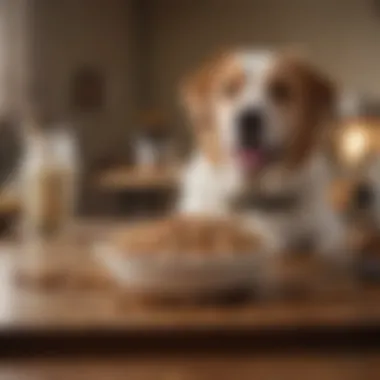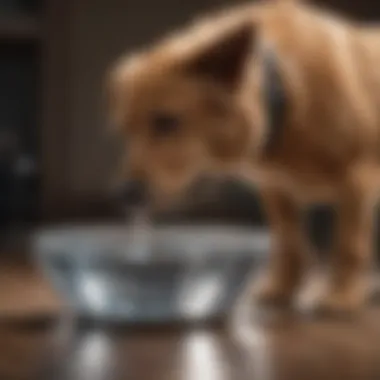Essential Remedies for Dogs with Diarrhea and Vomiting


Intro
Dealing with a dog that has diarrhea and vomiting can be distressing for both the pet and the owner. It is essential to understand the underlying reasons for these gastrointestinal issues and to provide adequate care. In this section, we will outline effective treatments and dietary modifications that can help your dog recover.
Understanding Your Pet
Understanding the specific needs of your dog is crucial during times of illness. Factors such as breed traits, temperament, and special health considerations play a significant role in how dogs respond to dietary changes and treatments.
Breed Traits
Certain breeds may be more prone to gastrointestinal issues than others. For example, small breed dogs like Chihuahuas and toy breeds often experience more significant stress-related stomach problems. Conversely, larger breeds, including Great Danes, may suffer from bloating, which can be compounded by vomiting.
Common Temperaments
How a dog reacts to illness can vary based on its temperament. A more anxious dog may refuse to eat or drink, exacerbating the problem. In contrast, a calm dog might be more accepting of dietary changes. Understanding these tendencies can help you determine the best approach during recovery.
Special Needs
Dogs with pre-existing health conditions may need specialized diets or treatments when experiencing diarrhea and vomiting. Always consult a veterinarian if your dog is on medication or has underlying health issues. This ensures the chosen treatment does not interact negatively with their current regimen.
Pet Care Essentials
Caring for a dog involves more than just providing food and water. Attention to nutrition, grooming, and overall health is vital.
Nutrition and Feeding Guidelines
When a dog has diarrhea or vomiting, a bland diet is often recommended. Good options include:
- Boiled chicken (without skin or bones)
- White rice
- Plain pumpkin (not the spiced pie mix)
- Plain, low-fat yogurt (if dairy is tolerated)
These foods can provide nutrients while being gentle on the stomach. Gradually reintroduce their normal diet as the dog begins to recover.
Grooming Tips and Techniques
While ill, your dog's grooming needs might change. Maintain a clean environment to prevent any potential for infections. Regularly check for signs of cleanliness around the rear area, especially after bouts of diarrhea. Keeping fur trimmed here can help.
Health and Wellness
Monitoring your dog's overall health during and after recovery is essential. This includes checking not only for continued symptoms like diarrhea and vomiting but also for signs of dehydration, such as lethargy and dry gums. Ensure fresh water is readily available at all times.
Culmination
Addressing diarrhea and vomiting in dogs requires attention to various factors including diet and breed-specific needs. By using this knowledge, dog owners can act swiftly and effectively, alleviating the distress experienced by the pet. Seeking veterinary assistance is paramount when symptoms persist or worsen.
Remember, your dog's health and well-being should always come first!
Understanding the Symptoms
Recognizing symptoms such as diarrhea and vomiting is crucial for dog owners. These conditions can stem from various underlying issues, making it essential to understand what is transpiring in your dog's body. By identifying these symptoms accurately, you can take appropriate remedial actions or consult a veterinarian in a timely manner.
Diarrhea in Dogs
Diarrhea is characterized by loose, watery stools that occur more frequently than normal. A dog may experience mild diarrhea, which might resolve on its own. However, persistent diarrhea can lead to dehydration and other complications. Common causes include abrupt dietary changes or consumption of unsuitable food. It is vital to monitor any changes in your dog's stool consistency and frequency, as these can reveal important insights into their health status.
Symptoms to Observe:
- Frequency of bowel movements
- Consistency of stool
- Presence of blood or mucus
Understanding these markers helps you determine when further action is needed. If diarrhea persists for more than two days, veterinary consultation is advisable.


Vomiting in Dogs
Vomiting is another concerning symptom and may occur alongside diarrhea. While it is not uncommon for dogs to vomit occasionally, recurrent vomiting could signify more serious health issues. Styles of vomiting vary. It can be acute or chronic and may sometimes include additional symptoms like lethargy or loss of appetite. Identifying whether the vomit contains food, bile, or blood is crucial for diagnosis.
Signs to Watch For:
- Frequency of vomiting episodes
- Color and content of vomit
- Behavioral changes
Timely observation of these signs can be beneficial in assessing the dog's condition and seeking necessary help.
Differentiating Between Causes
As diarrhea and vomiting can result from multiple sources, differentiating these causes is key to effective treatment. It’s imperative to consider recent dietary changes, exposure to toxins, or signs of infections. Taking a thorough history can provide context, aiding veterinarians in diagnosing the problem.
Common Causes to Evaluate:
- Recent diet changes or new treats
- Contact with harmful substances
- Exposure to other infected animals
By analyzing the context surrounding these symptoms, it is easier to understand the underlying issues. This understanding can pave the way for appropriate care, ensuring the well-being of your dog.
Potential Causes of Diarrhea and Vomiting
Understanding the causes behind diarrhea and vomiting in dogs is crucial for effective treatment and recovery. Identifying the root cause can aid in selecting appropriate interventions and prevent further complications. Early recognition and response to these symptoms can also lessen discomfort for your pet, leading to a quicker return to health.
Dietary Indiscretion
Dietary indiscretion is a frequent cause of gastrointestinal upset in dogs. This term refers to the consumption of inappropriate food, which may include human food, spoiled items, or other non-food substances. Dogs often exhibit this behavior when they have access to trash cans or leftovers not intended for them. When dogs eat something that does not sit well with their digestive system, it can result in both diarrhea and vomiting.
Some signs of dietary indiscretion include soft stools, vomiting shortly after eating, and a generally unsettled stomach. It's essential for pet owners to monitor their dog's diet closely. Ensuring dogs have access to nutritionally balanced food and limiting their ability to consume unsuitable items will help in avoiding this issue.
Infections
Infections are another potential cause of diarrhea and vomiting in dogs. Various bacterial, viral, and parasitic infections can lead to gastrointestinal distress. Common infectious agents include parvovirus, salmonella, and giardia. Infections can occur through contaminated food or water, as well as through direct contact with infected animals.
Symptoms of infection often extend beyond digestive issues, sometimes including fever and lethargy. Pet owners should seek immediate veterinary care if they suspect an infection, as prompt treatment can prevent more severe health issues.
Food Allergies or Intolerances
Food allergies or intolerances represent another common reason dogs may experience digestive problems. Unlike dietary indiscretion, these reactions stem from specific ingredients in their regular diet. Common allergens include beef, dairy, chicken, and wheat. Symptoms may include not only diarrhea and vomiting but also skin irritations or excessive itching.
It is essential to keep track of what your dog eats and observe for any signs of adverse reactions. If food allergies or intolerances are suspected, an elimination diet under veterinary guidance can help identify the problematic ingredients.
Toxins and Poisons
Exposure to toxins and poisons can cause immediate and severe gastrointestinal issues. Common household items that can be harmful include certain plants, human medications, and specific foods like chocolate, grapes, and onions. Symptoms of toxin ingestion may appear suddenly and can be life-threatening.
If pet owners suspect their dog has ingested something toxic, time is of the essence. Seeking urgent veterinary assistance is critical, as many poisons require medical treatment to prevent serious health consequences or even death.
Underlying Health Issues
Sometimes, diarrhea and vomiting may be symptoms of underlying health issues. Conditions like pancreatitis, liver disease, or kidney disorders can manifest in these ways. The cause may not always be easily identifiable and can require thorough veterinary examination and diagnostic tests.
Pet owners should monitor their dog closely for other symptoms that may indicate serious health problems. If diarrhea or vomiting persists for more than 24 hours or if accompanied by other concerning signs, seeking veterinary care is advisable.
Understanding these causes is key to managing your dog's health effectively. Proper attention can alleviate suffering and lead to recovery.
Immediate Care at Home
When a dog experiences gastrointestinal distress, immediate care at home can be crucial. Providing appropriate care during this time not only alleviates discomfort but can also prevent further complications. Proper home care can ease symptoms and promote recovery. The key elements of immediate home care include withholding food and maintaining hydration.


Withholding Food
Withholding food is a common recommendation for dogs with diarrhea and vomiting. This practice gives the digestive system a chance to rest while recovering. In the initial stages, this approach can prevent further irritation of the gastrointestinal tract. It is generally advised to refrain from feeding your dog for at least 12 to 24 hours, but water should always be available. Here are some considerations:
- Observe the Dog's Condition: Keep an eye on your dog’s symptoms. If vomiting has ceased and there is no more diarrhea after the waiting period, food can be gradually reintroduced.
- Choose the Right Time: Resuming feeding too soon can worsen the situation. Ensure that your dog is stable before offering food again.
- Start Slowly: When it’s time to feed again, consider bland diet components like boiled chicken and rice. Only small amounts are necessary at the beginning.
Hydration Maintenance
Hydration maintenance is essential when your dog is facing diarrhea and vomiting. Loss of fluids can lead to dehydration, which poses serious health risks. Ensuring that your dog remains hydrated is critical. Here are important strategies to support hydration:
- Encourage Water Intake: Provide fresh water at all times. If your dog is resistant to drinking, try offering ice cubes or a syringe (without the needle) to administer water slowly.
- Consider Electrolyte Solutions: Some pet owners opt for specially formulated electrolyte solutions designed for pets. These can help replenish lost electrolytes while keeping the dog hydrated.
- Monitor for Dehydration Signs: Pay attention to symptoms of dehydration, such as loss of skin elasticity, dry mouth, or lethargy. If these signs appear, it’s crucial to seek veterinary assistance.
Important Note: If vomiting persists despite maintaining hydration or if there are noticeable signs of distress, do not hesitate to contact your veterinarian. Early intervention can often lead to better outcomes for your pet.
Recommended Foods for Recovery
When a dog experiences diarrhea and vomiting, recovery is paramount. The right foods can aid in stabilizing gastrointestinal function. Recommended foods often focus on being easily digestible. This minimizes further irritation of the digestive tract. Pet owners should be observant and introduce these foods gradually.
Bland Diet Components
Boiled Chicken
Boiled chicken serves as a reliable protein source. Its lean nature helps avoid excess fat that might upset the stomach. Many dogs find boiled chicken appetizing, making it a common choice for recovery diets. The soft texture is gentle on the digestive system. However, it's vital to ensure all seasoning is omitted, as garlic and onion can be toxic to dogs. While it is nutritious, relying solely on boiled chicken for an extended period is not recommended due to its lack of balanced nutrients. Boiled chicken can help restore energy levels after a bout of illness.
White Rice
White rice is another staple recommended for dogs recovering from gastrointestinal issues. It is bland and provides easily digestible carbohydrates. This can help firm up loose stools. White rice is often mixed with boiled chicken to create a balanced meal. It is beneficial for dogs, as it reduces the digestive workload. However, it should not be the main food source long-term, as it lacks essential nutrients. Some dogs might not readily consume plain white rice, so mixing other ingredients can be necessary.
Pumpkin
Pumpkin is widely recognized for its health benefits and plays a valuable role in a recovery diet. It is rich in fiber, which can assist with both diarrhea and constipation. This makes it a versatile addition to a bland diet. Dogs generally like the taste of pumpkin and it helps to hydrate them. Pure pumpkin (not the spiced pie filling) can be served cooked or canned. However, excessive amounts may cause gas or bloating, so moderation is key. Including pumpkin can enhance a dog's fiber intake without being harsh on their digestive system.
Commercial Options
Prescription Diets
Prescription diets are formulated for dogs with specific health needs. They often include digestible ingredients and controlled levels of fat and fiber. These diets are beneficial choices for managing underlying health issues that cause gastrointestinal distress. A veterinarian typically recommends these specially designed foods. Not all dogs may take easily to prescription diets initially, as they may need time to adjust. However, they can significantly improve a dog's recovery trajectory when used correctly.
Probiotic Supplements
Probiotic supplements provide beneficial bacteria to support gut health. They help in restoring the natural balance of microorganisms in the intestinal tract. These supplements can be particularly useful after diarrhea and vomiting episodes. Probiotics aid digestion and boost the immune system, which may contribute to quicker recovery. When selecting a probiotic, ensure it is specifically designed for dogs. Each dog may respond differently, so monitoring their health after starting a probiotic is essential.
When to Contact a Veterinarian
Recognizing when to seek veterinary assistance for your dog experiencing diarrhea and vomiting is crucial. These symptoms can signal serious conditions that require professional intervention. Timeliness in reaching out to a veterinarian can make a significant difference in your dog’s health. Observing your dog and understanding when symptoms escalate is a responsibility that pet owners must embrace.
Signs of Dehydration
Dehydration is a major concern when a dog suffers from diarrhea and vomiting. A dog can lose a significant amount of fluids, leading to serious health issues. Watch for signs like dry gums, sunken eyes, and a loss of skin elasticity. To assess skin elasticity, you can gently pinch a small amount of skin on the back of the neck and release it. If it does not return quickly to its original position, your dog may be dehydrated. Early intervention can prevent further health complications.
Persistent Vomiting or Diarrhea
Vomiting or diarrhea that continues for more than 24 hours requires attention. Persistent symptoms can indicate underlying health issues, such as infections or obstructions. If your dog is unable to keep water down, even small amounts, it further complicates the situation. This lack of hydration can deteriorate your dog's health swiftly, requiring immediate veterinary assessment.
Accompanying Symptoms
Lethargy
Lethargy is a sign that your dog may be struggling. It manifests as a lack of energy, reluctance to move, or unresponsiveness to normal stimuli. If your dog is unusually quiet or disinterested, it could signal a more serious condition. Recognizing lethargy early can help in decision making regarding veterinary care. It is not common for a healthy dog to exhibit such behavior, so monitoring energy levels is essential.


Bloating
Bloating, or abdominal distension, is another concerning symptom. It may indicate potential gastrointestinal issues, including torsion or bloat. This can be life-threatening and warrants immediate veterinary care. If your dog appears to have a swollen abdomen or exhibits signs of discomfort when touched, do not hesitate to contact a veterinarian. Early diagnosis can prevent severe complications.
Blood in Stool or Vomit
The presence of blood in either stool or vomit is alarming. This symptom can arise from various causes, ranging from minor issues such as dietary indiscretion to serious problems like internal bleeding. Monitoring your dog's elimination habits is critical. If you observe any blood, contacting a veterinarian should be a priority. Blood is a clear indicator that something is wrong and requires urgent evaluation to determine the cause and appropriate treatment.
It is essential to pay close attention to these signs. Early recognition and response can significantly improve the chances of a positive outcome for your dog.
Preventive Measures
Preventive measures play a crucial role in maintaining the overall health of dogs, especially concerning gastrointestinal health. Implementing a proactive approach can help mitigate the chances of experiencing diarrhea and vomiting. Understanding these measures is essential for pet owners who want to provide the best care for their furry companions.
Maintaining a Balanced Diet
A balanced diet is vital in supporting a dog's digestive health. Consuming high-quality dog food that meets the nutritional needs of your pet can prevent digestive upset. When dogs consume a well-rounded diet, it helps to regulate their digestive system and reduces the risk of gastrointestinal disturbances.
It's important to monitor the ingredients in dog food. Here are some points to consider:
- Avoid Excessively Rich Foods: Foods high in fat can lead to pancreatitis and upset stomachs.
- Introduce New Foods Gradually: Switching diets should be a gradual process to avoid shocking the digestive system.
- Check for Allergens: Identify and avoid food ingredients that trigger allergies or intolerances in dogs.
By being mindful of what your dog eats, you can significantly lower the risk of related health issues.
Regular Veterinary Check-ups
Regular veterinary check-ups are instrumental in detecting potential health problems before they escalate. Veterinarians can provide essential insight into your dog’s health status, including their digestive system. Routine exams are helpful in identifying underlying conditions that may cause diarrhea or vomiting.
During veterinary visits, consider asking about:
- Proper Vaccination: Keeping vaccinations up to date can prevent infections that lead to gastrointestinal symptoms.
- Parasitic Control: Regular deworming is necessary, as parasites can cause severe digestive issues.
- Dental Health: Dental problems can influence overall health, including the digestive system.
Staying proactive in your dog's health care can help prevent unexpected illness.
Limiting Access to Potential Toxins
Limiting access to potential toxins is essential in promoting safety and health for dogs. Many common household items and plants are toxic to dogs, and ingestion can lead to severe vomiting and diarrhea.
Here are some potential toxins to be aware of:
- Certain Foods: Chocolate, grapes, and onions are harmful.
- Common Household Products: Cleaning supplies and antifreeze can be dangerous if ingested.
- Medications: Human medications should always be kept out of reach.
Assess your environment to eliminate hazards, ensuring your dog's space is safe from potential toxic materials.
By being vigilant and attentive to preventive measures, you safeguard your dog’s health and well-being.
The Role of Probiotics
Probiotics play a significant role in maintaining gastrointestinal health in dogs, especially when they experience issues like diarrhea and vomiting. These beneficial microorganisms help balance the gut flora, which is essential for proper digestion and overall health. When a dog suffers from gastrointestinal distress, the natural balance of bacteria in the gut may be disrupted. Probiotics can help restore this balance, promoting better digestive function and supporting the immune system.
Including probiotics in your dog’s diet during recovery can also help in the process of healing. They can shorten the duration of diarrhea and improve consistency, which is crucial when a dog is facing gastrointestinal issues. Therefore, understanding how probiotics work and how to choose the right ones is vital for pet owners.
How Probiotics Help
Probiotics contribute to the health of the gastrointestinal tract in multiple ways:
- Restoration of Gut Flora: Probiotics introduce beneficial bacteria that can help restore natural gut flora, disrupted due to illness or dietary indiscretion.
- Digestive Support: They aid in breaking down food and absorbing nutrients more efficiently, allowing the body to utilize food better, especially during recovery.
- Reduction of Pathogens: By balancing the gut environment, probiotics can help inhibit the growth of harmful bacteria, reducing the risk of further digestive upset.
- Boosting Immune Function: Healthy gut flora is linked to a more robust immune response, offering additional protection against infections.
- Managing Stress: Stress can negatively affect a dog’s digestive health. Probiotics may mitigate stress-related gastrointestinal symptoms.
In summary, probiotics serve as a fundamental aid in speeding up recovery during episodes of diarrhea and vomiting, thereby enhancing the overall health of your dog.
Selecting the Right Probiotic
When considering probiotics for your dog, several factors should be taken into account:
- Strain Variety: Different strains of probiotics serve different purposes. For instance, Lactobacillus rhamnosus and Bifidobacterium animalis are common choices that support gut health.
- Form and Delivery: Probiotics come in various forms, including powders, capsules, or treats. Choose one that is easy to administer and is palatable for your dog.
- Colony Forming Units (CFUs): This metric indicates the potency of the probiotic. A higher CFU count is not always better; it's essential to choose a product formulated for dogs. Typically, 1 to 10 billion CFUs may be effective.
- Quality Ingredients: Assess the safety and quality of the product you select. Look for reputable brands, preferably those that conduct clinical trials and have positive reviews.
- Consulting Veterinarian: Always consult with a veterinarian before introducing any new supplement, especially if your pet has pre-existing health conditions or is on medications. They can recommend the best probiotic options based on your dog’s specific condition.
Choosing the right probiotic can make a significant difference in your dog's recovery from gastrointestinal disturbances. With the correct product, you can support their digestive system more effectively.



